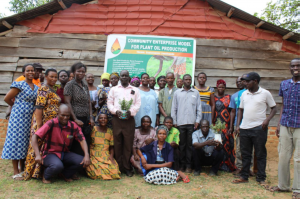Growing social innovation
2 August 2021
A three-way partnership to grow mint commercially on a not-for-profit basis has brought benefits to rural Uganda. The Community Enterprise Model for Plant Oil Production (CEMPOP) was forged five years ago as a partnership between academics in Cardiff University’s School of Biosciences, the Department of Food Technology & Nutrition in Makerere University, Kampala, and the Uganda National Crops Resources Research Institute. Peter Randerson, CEMPOP project coordinator, picks up the story…
‘Talking with our local plant chemist and our Ugandan colleagues back in 2016, the idea emerged to grow the aromatic herb mint, as a novel non-food crop in a rural area suffering depressed agriculture, unemployment, and critically low incomes (annual average $125 US).
 Mint has great market potential. It is grown commercially in India, Morocco, South Africa, and USA to serve the world market in essential oils – “essential” meaning its essence or smell.
Mint has great market potential. It is grown commercially in India, Morocco, South Africa, and USA to serve the world market in essential oils – “essential” meaning its essence or smell.
Our partners enthusiastically agreed to set up the local infrastructure – plant nurseries, field trials, distillation equipment and research into minted products. Our vision: to engage local farmers in creating a not-for-profit mint value chain, developing novel products for regional markets.
Why is mint a potential cash crop for rural Uganda? The mint family produce essential oils in glands in their leaves containing chemicals such as menthol, used as flavouring and fragrance agents in everyday products from tea to toothpaste.
Bringing together partners with expertise in plant chemistry, plant genetics and agricultural practice, we aim to create new varieties of mint with improved oil production, targeting specific chemicals. Fertile land suitable for mint is available and seasonal rains provide adequate water. Our Ugandan colleagues are developing novel flavoured food and drinks as well as personal care products with mint fragrance such as soap, shampoo and hand lotion, for market through local community enterprise groups. Oil extracted from cat-mint contains a powerful insect repellent chemical, and we hope to develop a low-cost mosquito repellent for local use.
 Initial funding for CEMPOP came from Welsh Government’s aid schemes, Hub Cymru Africa and Wales for Africa, which established mint nurseries, distillery and processing equipment and training for farmers, while in Cardiff we focussed on the science, with chemical analysis of mint oil components and gene sequencing of mint varieties.
Initial funding for CEMPOP came from Welsh Government’s aid schemes, Hub Cymru Africa and Wales for Africa, which established mint nurseries, distillery and processing equipment and training for farmers, while in Cardiff we focussed on the science, with chemical analysis of mint oil components and gene sequencing of mint varieties.
On the back of these studies, we were able to win a substantial research council grant under the Global Challenges Research Fund (GCRF) aimed at the science of mint oil biochemistry and to develop novel products for market.
By modifying the genes which control production of essential oils in the leaves, we can improve oil yields and boost the synthesis of valuable chemicals such as menthol (the minty essence), carvone (spearmint chewing gum taste) and nepetalactone (organic mosquito repellent and beloved of all cats).
We aim to create new “super-mint” varieties, to be grown, distilled and processed by rural communities in Uganda.
This aligns with the UN Sustainable Development Goals to “end poverty”, promote “economic growth” and “foster innovation” among the ODA’s list of “Least Developed Countries”.
Ironically, in line with other GCRF-funded research, the recent cut to UK Government’s foreign aid budget has come as a severe blow as it will curtail lab and field activities for both Cardiff and Uganda staff mid-way through the project.
Our thanks go to BIOSI and Cardiff Uni for support towards mitigating this sudden loss of funds.
The CEMPOP-Uganda team have launched two spin-out projects related to the mint work:
“Eco-Kyooto”, funded from Cardiff Uni’s GCRF, aims to measure the health benefits of a smoke-free, fuel-efficient, cooking stove for traditional Ugandan homes.
 “Buyonjo” (Hygiene in local language), supported by Wales and Africa funding, created hand sanitizer stations for rural Uganda (mint scented, of course!). This community-led response to the recent alarming upsurge in the delta variant of COVID-19, again provides a local solution to an urgent public health problem.
“Buyonjo” (Hygiene in local language), supported by Wales and Africa funding, created hand sanitizer stations for rural Uganda (mint scented, of course!). This community-led response to the recent alarming upsurge in the delta variant of COVID-19, again provides a local solution to an urgent public health problem.
The CEMPOP team in Uganda employs local rural labour managing mint crops and fabricating equipment linked to developing and marketing mint-based products.
Enterprises grown from earlier CEMPOP projects include brick-making, stone quarrying, snacks, shoe-making and natural honey processing, whilst related services include transport, tea-bags, mint pickers/packers and wood/metal fabricators.
Such outcomes strengthen the existing links between Wales and Uganda (e.g. Wales Government’s Size-of-Wales tree planting projects). Our ongoing academic link with Makerere University fosters research collaboration and offers opportunities for training and study between Kampala and Cardiff.
A recent bid to create a mango processing plant for the rural community near Mbale failed to attract Innovate UK funding. Much of the seasonal mango crop goes to waste due to low prices and lack of capacity to create more valuable juice and pulp products.
Such a scheme again requires local agricultural know-how, support from local community leaders and a Food Technology partner (Makerere Uni) So, CEMPOP is seeking an injection of capital “aid” to initiate a not-for-profit community-led enterprise. Anyone for crowd-funding?
Dr Peter Randerson, CEMPOP project coordinator, School of Biosciences. Contact randerson@cardiff.ac.uk